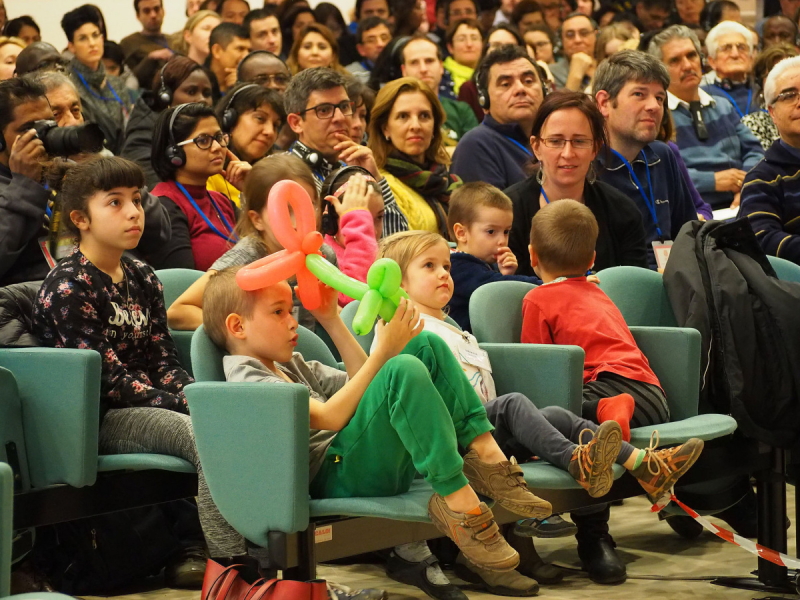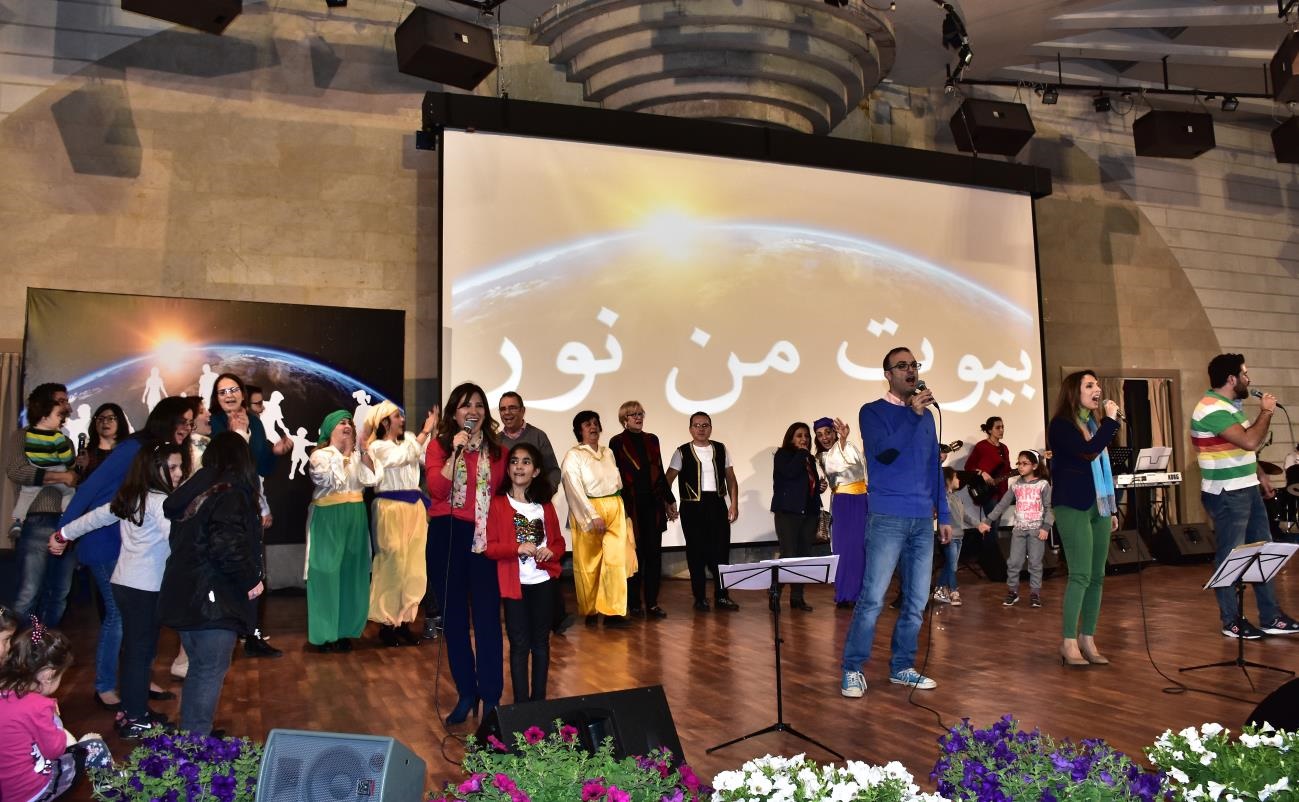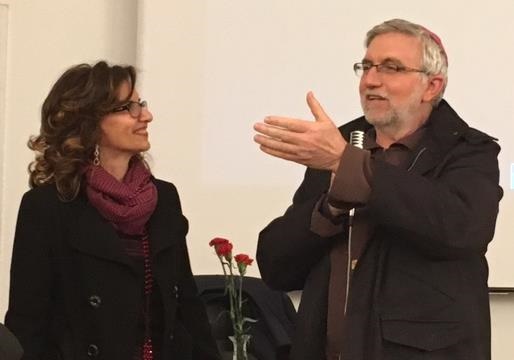21 Apr 2017 | Non categorizzato
If we could look at the world from a distance with a powerful zoom lens, the way that astronauts do, we would see our planet in peace and even without frontiers. At a close distance instead, the images available transmit details of all sorts of divisions, hatred and abuse. At times, the risk of observing our history and our planet from too far or too near is that reality can be distorted and judgments decoyed. So as not to lose sight of the direction humanity is moving towards, what should the right distance be? Upon questioning themselves on the transformations of the contemporary era, the fields of economy, sociology, natural sciences, and philosophy all converge on some principles, like interdependence – what comes about in one place may have consequences elsewhere. Each fragment or portion of humanity reveals its greatest potential in belonging to a common destiny. We will not save ourselves alone, nor can we be satisfied to be enclosed within a shell, if all around there is diffused suffering. «The world should convince itself that it is called to unity» was the challenge that Chiara Lubich launched to the Youths for a United World in 1985. For more than 20 years the youths for a united world have nurtured themselves with this vision of the common good, and work to make it a reality. Attracted by the infinite possibilities for fraternity, the possible sole destiny for history and contemporary humanity, hundreds of youths of various nationalities are on their way to Loppiano (Italy). Their initiatives at planetary level, will converge in the United World Week which since 1995, has been a showcase of the actions for fraternity underway throughout the world. These are actions that in turn merge into the United World Project with the objective of calling the attention of civil society and the international institutions to a culture of fraternity.

21 Apr 2017 | Non categorizzato
 Better work “After an accident I lost a good job, and my wife’s salary was not enough for my family to get ahead. Yet Providence did not forget us, helping us to find small bits of work just at the right times so we could pull ourselves up. In the evening, together with the children, we prayed for help – not just for ourselves, but for all those in need. Six months after the accident, just when the economy in our country took a critical turn, I found a job that was better than the one I lost.” J. L. – Uruguay The next room “I was in the hospital, lying in darkness because of my health and the medicine I was taking. I didn’t know what to do to get out of it. I heard a bell ringing; someone in the next room was calling the nurse. I got up to see if I could lend a hand. All that was needed was to give someone some water. I stopped beside his bed, showing interest in his life and trying to listen deeply to his words. I don’t know how, but suddenly I felt lighter.” T. d. M. – Italy An unexpected gift “Having been married for 50 years, we have lived through – as Ecclesiastes says – times of joy and pain. One evening, in particularly tight circumstances, we were counting how much money we had left and pondering what we could buy to give the children something to eat. In that moment a friend called – he wanted to pass by after having received two turkeys as a gift to give us one. It’s so true that we have a Father in heaven who never abandons us.” T. e R. – Poland Change of plan “I travel often for work, so I have to make a detailed schedule of what I’m doing, while staying ready to change my plans. I was surprised, in fact, when I realized that something unexpected, if it’s taken from the hands of God, becomes something better than what I had planned myself. This “making space for God” is not just for when I travel, but in many other circumstances, and it is a true lesson on staying vigilant. Seeing the beautry of God’s plans, even if it costs me to lose mine, I have to say that the “invisible director” knows how to point the way to my true fulfilment, my true happiness.” T.M. – Poland
Better work “After an accident I lost a good job, and my wife’s salary was not enough for my family to get ahead. Yet Providence did not forget us, helping us to find small bits of work just at the right times so we could pull ourselves up. In the evening, together with the children, we prayed for help – not just for ourselves, but for all those in need. Six months after the accident, just when the economy in our country took a critical turn, I found a job that was better than the one I lost.” J. L. – Uruguay The next room “I was in the hospital, lying in darkness because of my health and the medicine I was taking. I didn’t know what to do to get out of it. I heard a bell ringing; someone in the next room was calling the nurse. I got up to see if I could lend a hand. All that was needed was to give someone some water. I stopped beside his bed, showing interest in his life and trying to listen deeply to his words. I don’t know how, but suddenly I felt lighter.” T. d. M. – Italy An unexpected gift “Having been married for 50 years, we have lived through – as Ecclesiastes says – times of joy and pain. One evening, in particularly tight circumstances, we were counting how much money we had left and pondering what we could buy to give the children something to eat. In that moment a friend called – he wanted to pass by after having received two turkeys as a gift to give us one. It’s so true that we have a Father in heaven who never abandons us.” T. e R. – Poland Change of plan “I travel often for work, so I have to make a detailed schedule of what I’m doing, while staying ready to change my plans. I was surprised, in fact, when I realized that something unexpected, if it’s taken from the hands of God, becomes something better than what I had planned myself. This “making space for God” is not just for when I travel, but in many other circumstances, and it is a true lesson on staying vigilant. Seeing the beautry of God’s plans, even if it costs me to lose mine, I have to say that the “invisible director” knows how to point the way to my true fulfilment, my true happiness.” T.M. – Poland

21 Apr 2017 | Focolare Worldwide
 Every year, spring blossoms a few days earlier in order to remember Chiara Lubich. March 14th is celebrated with a variety of new and annual events in every part of the world, each with a style all its own to remember the Focolare foundress on the anniversary of her death – or better – her birth to Heaven that happened in 2008. In 2017 this special day was interwoven with another event, the 50th anniversary of the New Families, which is a branch of the Focolare Movement that embraces 800 thousand families from around the world who strive to live the spirituality of unity and spread values of universal brotherhood in their local environments. The powerful title, Chiara Lubich and the Family, was meant to express the special care and attention the foundress gave to a “daring, beautiful and demanding” calling whose “immeasurable and precious values could change the world and transform it into a family, if those same values were applied to humankind.” “Here, in front of you, I seem to see Jesus who looks at the world, looks at the crowds and pities them,” Chiara Lubich had said in her historic founding address on July 19, 2967. “Because, of all the portions of the world, the most broken part has been placed on your shoulders, the part most like Jesus Forsaken. (…) May this pity not remain at the level of the sentiments, but be transformed into works.”
Every year, spring blossoms a few days earlier in order to remember Chiara Lubich. March 14th is celebrated with a variety of new and annual events in every part of the world, each with a style all its own to remember the Focolare foundress on the anniversary of her death – or better – her birth to Heaven that happened in 2008. In 2017 this special day was interwoven with another event, the 50th anniversary of the New Families, which is a branch of the Focolare Movement that embraces 800 thousand families from around the world who strive to live the spirituality of unity and spread values of universal brotherhood in their local environments. The powerful title, Chiara Lubich and the Family, was meant to express the special care and attention the foundress gave to a “daring, beautiful and demanding” calling whose “immeasurable and precious values could change the world and transform it into a family, if those same values were applied to humankind.” “Here, in front of you, I seem to see Jesus who looks at the world, looks at the crowds and pities them,” Chiara Lubich had said in her historic founding address on July 19, 2967. “Because, of all the portions of the world, the most broken part has been placed on your shoulders, the part most like Jesus Forsaken. (…) May this pity not remain at the level of the sentiments, but be transformed into works.”  Works that can now be seen: cultural projects, support for minors, seminars for families, help for separated couples, social and educaitonal projects that highlight universal family values from within the great human family. Concrete action is the main characteristic of a family, the basic cell of society, and this was strongly underscored in the two Synods that dealt with the topic of the family. The contents of those Synods then came together in Pope Francis’s Apostolic Exhortation, The Joy of Love. The joy of love that the pope speaks of is well represented by the thousands of voices and it is on the faces of the people and families that converged on Loppiano, Italy, from all five continents last March to attend the event, three days to learn the art of reciprocity. “Married life is like a ship,” one family from Peru commented, “if you try to row by yourself it takes a lot of effort.” It is the art of loving that gives strength to the family to regenerate, through trust, forgiveness, individual responsibility, creativity, acceptance and supportiveness.
Works that can now be seen: cultural projects, support for minors, seminars for families, help for separated couples, social and educaitonal projects that highlight universal family values from within the great human family. Concrete action is the main characteristic of a family, the basic cell of society, and this was strongly underscored in the two Synods that dealt with the topic of the family. The contents of those Synods then came together in Pope Francis’s Apostolic Exhortation, The Joy of Love. The joy of love that the pope speaks of is well represented by the thousands of voices and it is on the faces of the people and families that converged on Loppiano, Italy, from all five continents last March to attend the event, three days to learn the art of reciprocity. “Married life is like a ship,” one family from Peru commented, “if you try to row by yourself it takes a lot of effort.” It is the art of loving that gives strength to the family to regenerate, through trust, forgiveness, individual responsibility, creativity, acceptance and supportiveness.  The event at Loppiano was the pivot point for many other events around the world, beginning with last year’s January 27th inaugural event in Cairo, Egypt, and then for many successive events in Panama, Croatia, Italy, Uganda, Tanzania, USA, Brazil, France, Kenya, Panama, Lithuania, Australia, Belgium, Canada, Burundi, Singapore, and more. Practical experiences were presented and seminars on the themes of education, the relationship of the married couple, acceptance, stories from daily life and hidden acts of heroism in war zones, solidarity in moments of difficulty, support for disadvantaged populations, together with workshops, shows, festivals and public prayer services. Although it is difficult to list them all and describe the main characteristic of each one, it would be impossible not to recognize in these festive family gatherings in collaboration with other movements, Church, Religious and civil institution representatives –“seeds of communion for the people of the Third Millennium,” which were prophetically foretold by Chiara Lubich in 1993.
The event at Loppiano was the pivot point for many other events around the world, beginning with last year’s January 27th inaugural event in Cairo, Egypt, and then for many successive events in Panama, Croatia, Italy, Uganda, Tanzania, USA, Brazil, France, Kenya, Panama, Lithuania, Australia, Belgium, Canada, Burundi, Singapore, and more. Practical experiences were presented and seminars on the themes of education, the relationship of the married couple, acceptance, stories from daily life and hidden acts of heroism in war zones, solidarity in moments of difficulty, support for disadvantaged populations, together with workshops, shows, festivals and public prayer services. Although it is difficult to list them all and describe the main characteristic of each one, it would be impossible not to recognize in these festive family gatherings in collaboration with other movements, Church, Religious and civil institution representatives –“seeds of communion for the people of the Third Millennium,” which were prophetically foretold by Chiara Lubich in 1993.




